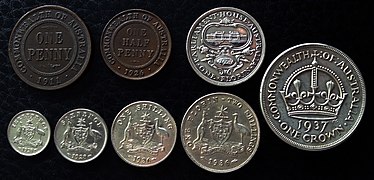Coat of arms of Australia
The coat of arms of Australia, officially the Commonwealth Coat of Arms,[1] is a formal symbol of the Commonwealth of Australia.[2] It depicts a shield, containing symbols of Australia's six states, and is held up by native Australian animals, the kangaroo and the emu.[3] The seven-pointed Commonwealth Star surmounting the crest also represents the states and territories, while golden wattle, the national floral emblem, appears below the shield.[3]
Commonwealth Coat of Arms
19 September 1912
The Commonwealth Star: A seven-pointed star, or (gold)
Or and azure (blue)
Dexter (left) a red kangaroo, sinister (right) an emu, both proper (natural colours)
none, golden wattle is depicted in its place in commonly used versions
none, the name of the country is written on a scroll in commonly used versions
7 May 1908
19 September 1912
Argent and azure
Azure on an Inescutcheon Argent upon a Cross of St. George cottised of the field five six pointed Stars of the second (representing the Constellation of the Southern Cross) all within an Orle of Inescutcheons of the second, each charged with a Chevron Gules
Red kangaroo and emu, both proper
Grassy field proper
Advance Australia
The first arms were authorised by King Edward VII on 7 May 1908, and the current version by King George V on 19 September 1912, although the 1908 version continued to be used in some contexts, notably appearing on the reverse of the sixpenny coin.
Use[edit]
The Commonwealth Coat of Arms is the formal symbol of the Commonwealth of Australia that signifies Commonwealth authority and ownership. The Arms are used by Australian Government departments and agencies, statutory and non-statutory authorities, the Parliament and Commonwealth courts and tribunals. Senators and Federal Members of the Australian Parliament may also use the Arms in the course of their duties as Parliamentarians.[2] The coat of arms should never be used where it could wrongly imply a formal guarantee, sponsorship or endorsement by the Commonwealth.[16] Use of the arms by private citizens or organisations is rarely permitted; however, there are provisions for use by sporting bodies and in educational publications. Use of the coat of arms without permission may breach the Competition and Consumer Act 2010, section 145.1 of the Criminal Code Act 1995 or section 39(2) of the Trade Marks Act 1995.[1][17] The import of goods bearing the arms is also illegal according to the Customs (Prohibited Imports) Regulations.
There is a full colour version and nine heraldically correct official versions exist for single-colour reproduction.
The coat of arms was the basis of Queen Elizabeth's Personal Australian Flag,[18] and since 1973 a slightly modified version has formed the basis of the Great Seal of Australia.[19]
The coat of arms has appeared on Australian coinage since the coins for the Australian pound were minted in the early 20th century. Until 1936, the 1908 coat of arms featured on the reverse of all silver coins in regular circulation(3d, 6d, 1'/, 2'/). After 1936, the current coat of arms was featured on the reverse of the Florin (2'/), while the 1908 arms remained on the sixpence (6d). Since decimalisation in 1966, the current coat of arms has featured on the reverse of both variants of the 50-cent coin.
The coat of arms is used as badge of rank for Warrant Officers Class 1 (Army)[20] and Warrant Officer (Navy[21] and Air Force[22]). A more stylised version is used as a badge of rank for Warrant Officer of the Navy, Regimental Sergeant Major of the Army and Warrant Officer of the Air Force.
Australians are frequently claimed to be the only people who eat the animals on their coat of arms,[23] and the combination of both kangaroo and emu meat in a single dish such as pie[24] or pizza[25] is known as the Coat of Arms.












